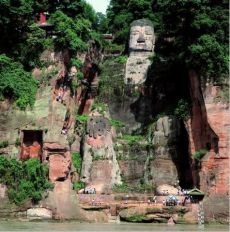Giant Buddha at Leshan
The Giant Buddha at Leshan (乐山大佛), carved out of the waterfront cliff of Mount Lingyun, has been sitting sedately by the Minjiang River in Sichuan Province for more than 1,000 years. It is the world's largest cliffside carving, known as "Mountain Buddha" or "Buddha Mountain."
The giant Budda is a statue of Maitreya sitting, face to the west, in the recesses of Lingyun Mountain. It is 71 m tall with its head being 14.7 m high and 10 m wide; shoulders 24 m across; ears sever m long with ear holes that allow two persons to stand in each one; and feet each 8.5 m wide and capable of sitting 100 people. Though colossal, the carving has lineal elegance and is detailed and well proportioned, reflecting the magnificent artistic style of the heyday of the Tang Dynasty.
On the chest of the Giant Buddha there is a sealed cave. The stone that blocks the entrance of the cave is a damaged stele inscribed with a contemporary account about the reconstruction of the Tianning Pavilion during the Song Dynasty. Inside the cave are waste iron materials, lead sheets, and bricks. It is said that a wooden pavilion shelter was built over the statue when it was completed during the Tang Dynasty. Today the pillar foundations and holes can still be seen on the shoulders, legs, arms, chest, and feet of the Giant Buddha, indicating that a building once existed there.
The Lingyun Temple behind the right side of the Buddha's head was built during the Tang Dynasty. Popularly known as the Giant Buddha Temple, it is composed of Lokapala and Mahavira halls and a Scripture Tower.
